Let’s be honest — you don’t need $1,000-per-month SEO tools for content marketing when other alternatives deliver similar results for a fraction of the cost.
Without the right tools, your content marketing strategy can fall by the wayside, no matter how much you spend.
It’s best to be strategic and invest instead in affordable tools to build a powerful SEO stack that aligns with your content needs.
In this guide, we’ll walk you through affordable (and some free!) SEO content marketing tools that cover your marketing goals.
Table of Contents
How to Choose the Right SEO Tools for Content Marketing
It’s easy to lose yourself in the maze of tools if you don’t know what to look for.
Here are some key features you should consider while choosing the best SEO tools for your content marketing goals.
Keyword Research and Analysis
Keyword research is the holy grail of every SEO strategy, so you want to ensure your chosen tool gets it right. One of the most vital hallmarks of any SEO tool is its ability to deliver search volume and trend data.
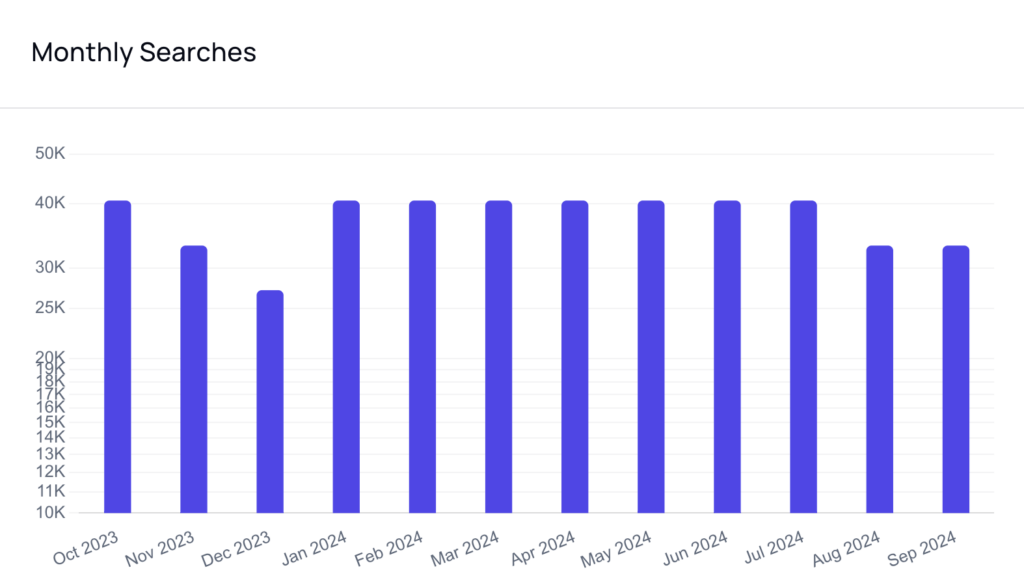
With this feature, you’ll understand how frequently people search for a term and whether it is gaining or losing popularity.
Keyword tools typically show live search engine page results (SERPs) where you can review how your competitors use specific keywords.
A good SEO tool also offers keyword difficulty scores, allowing you to determine how competitive it is to rank for a certain keyword.
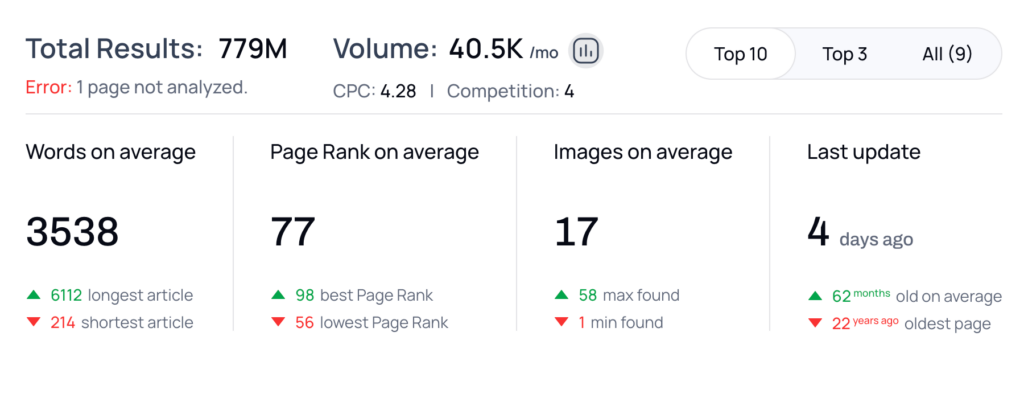
Lastly, any top-tier SEO tool must be able to generate long-tail keyword suggestions, i.e., niche phrases aimed at certain audience demographics, as they are easier to rank for than highly competitive keywords.
For example, instead of targeting a popular but competitive key phrase like “coffee shops,” you might attract a more niche audience with a long-tail keyword like “best coffee shops with vegan menu in Brooklyn.”
Content Creation and Planning
Content marketing is a well-oiled machine that runs on months of planning and content creation.
That’s why you must rely on tools that help your content stand out by highlighting content gaps, i.e., small pockets of opportunity where you can rank well.
These tools should be able to generate relevant topic ideas to fill gaps in your keyword list, such as trending or evergreen content suggestions.
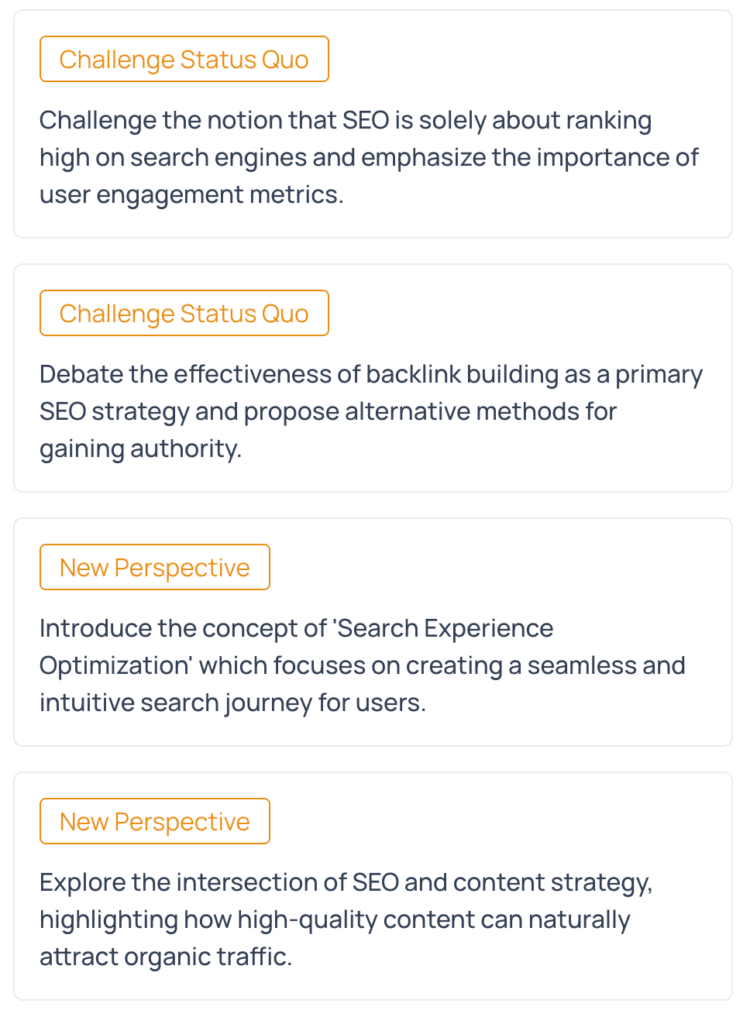
Lastly, a content marketing tool should help you piece all aspects of your content strategy together by providing integrated calendars that allow you to easily schedule and organize your content plans well in advance.
Content Analysis and Optimization
SEO is great, but it means nothing if your content is not meaningful or useful to your target audience.
You need tools that tell you whether your content is readable and engaging and provides readers with valuable takeaways.
Content analysis tools help in this aspect by reviewing content clarity and sentence length and determining whether your content flows smoothly.
That’s why good content analysis tools must examine and improve the vital aspects of content structure, such as:
- Headings
- Subheadings
- Bullet points
- General formatting
Some tools provide on-page SEO recommendations by reviewing technical aspects such as meta descriptions and title tags.
Optimizing your content using SEO tools is equally important. You can do this by using tools that help you analyze SERP trends, so you can see how your competitors are structuring their content and the topics they are ranking for.
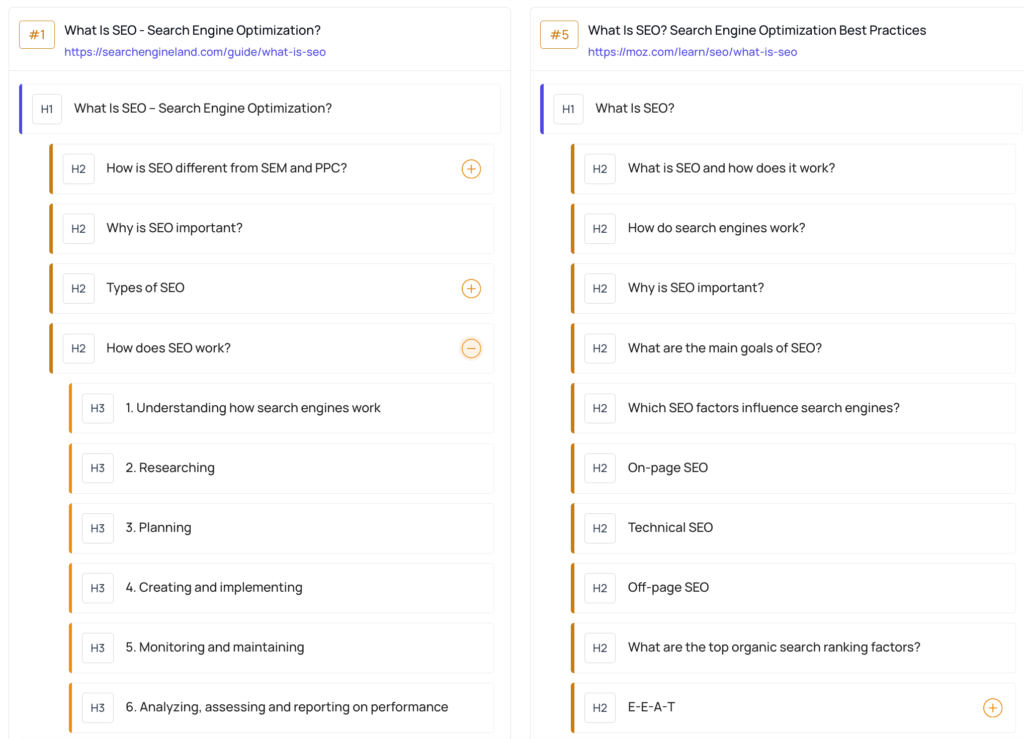
You’ll be better able to understand what topics are presently resonating with your audience and which content formats are most popular (video, long-form, infographics).
It can also help you differentiate your content by adding key topics your competitor hasn’t covered in their article.
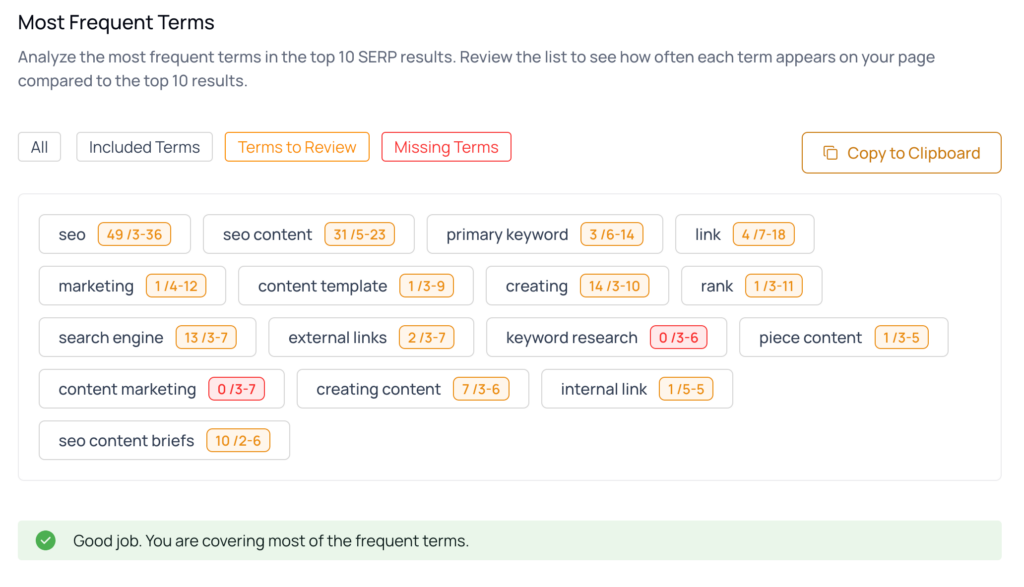
Performance Tracking and Reporting
A lot of work still needs to be done once your content is live. But don’t worry. Several SEO tools offer performance-tracking reports that help you understand whether your SEO strategy is working.
For example, some tools have rank-tracking features that monitor where your pages rank for certain keywords over time.
They also analyze the organic traffic to your content and identify which pages are gaining the most traction.
Our Selection of SEO Content Marketing Tools
Ubersuggest
Ubersuggest has excellent all-in-one SEO features to help you enhance your content marketing efforts.
Its affordable and beginner-friendly features make it more attractive than industry heavyweights like SEMrush or Ahrefs, which carry hefty price tags.
Kickstart your content strategy with Ubersuggest’s outstanding keyword research feature.
It helps you find relevant and high-value keywords to shape your content and attract target audiences, besides providing search volume, an SEO difficulty score, and related keyword suggestions.
Under the Keyword Research section, a “Similar Websites” subsection shows you how you stack against your competitors in the SERPs.
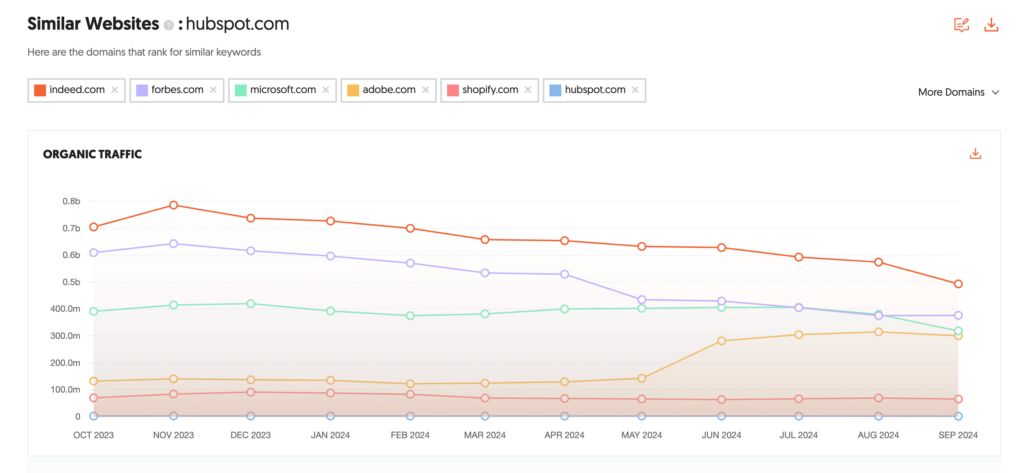
One of its most useful features is the “Keyword Ideas” search, which returns a list of the best-performing topics in your niche you can target to build your content.
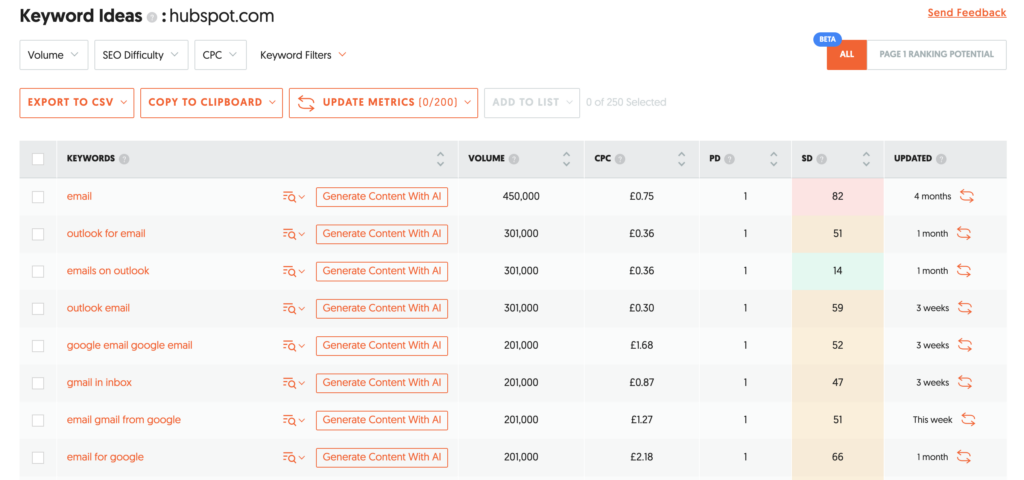
You can also check which articles in this niche have attracted the most backlinks or shares, inspiring you to create similar content.
The Site Audit feature, which scans your website for glaring SEO errors, is also extra helpful. It also gives you tips to fix these technical issues, such as adding meta descriptions or relevant sub-headings.
Pricing: You can sign up for a free trial or purchase a monthly plan ranging from $29 to $99. For a one-time fee, you can purchase a lifetime plan.
Alternatives: SEMrush, Ahrefs
thruuu
thruuu is another versatile tool that proves you don’t need big-budget software to create high-ranking content. It has all the markers of a reliable, budget-friendly content marketing tool.
It is especially lauded for its competitor analysis features, which give you an overview of the top-ranking pages for a specific keyword.
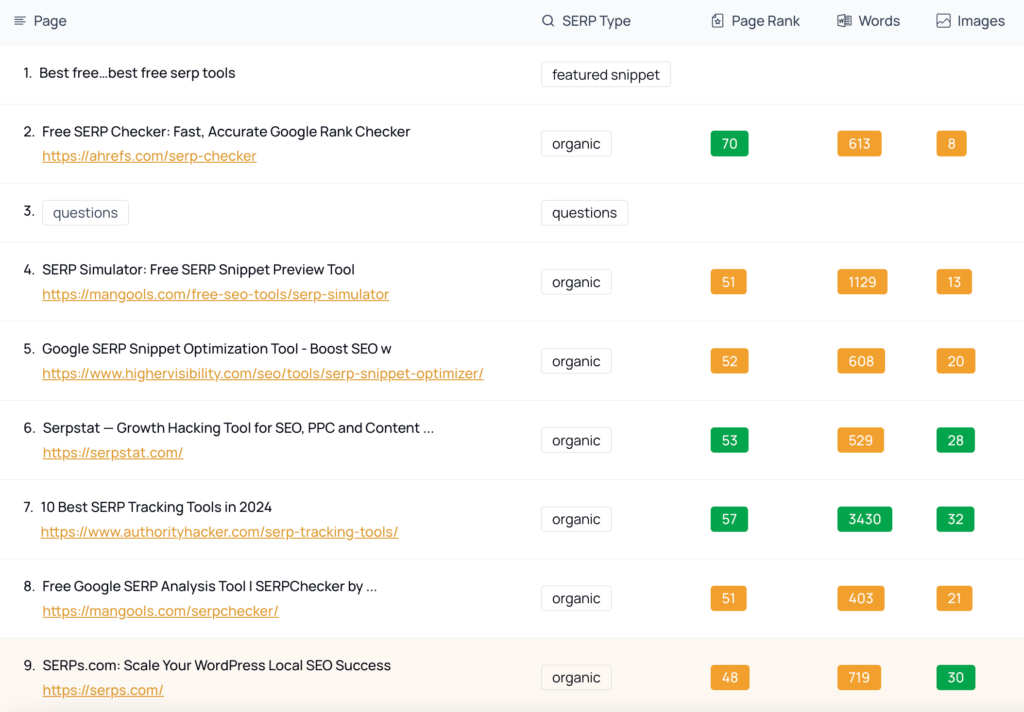
There’s a convenient option to “Open Live SERP” so you can see firsthand how competing pages structure their content.
Next, thruuu takes the effort out of developing a content plan by creating a brief for you in seconds. All you have to do is click the “Create Brief” option to receive a well-rounded outline you can build on.
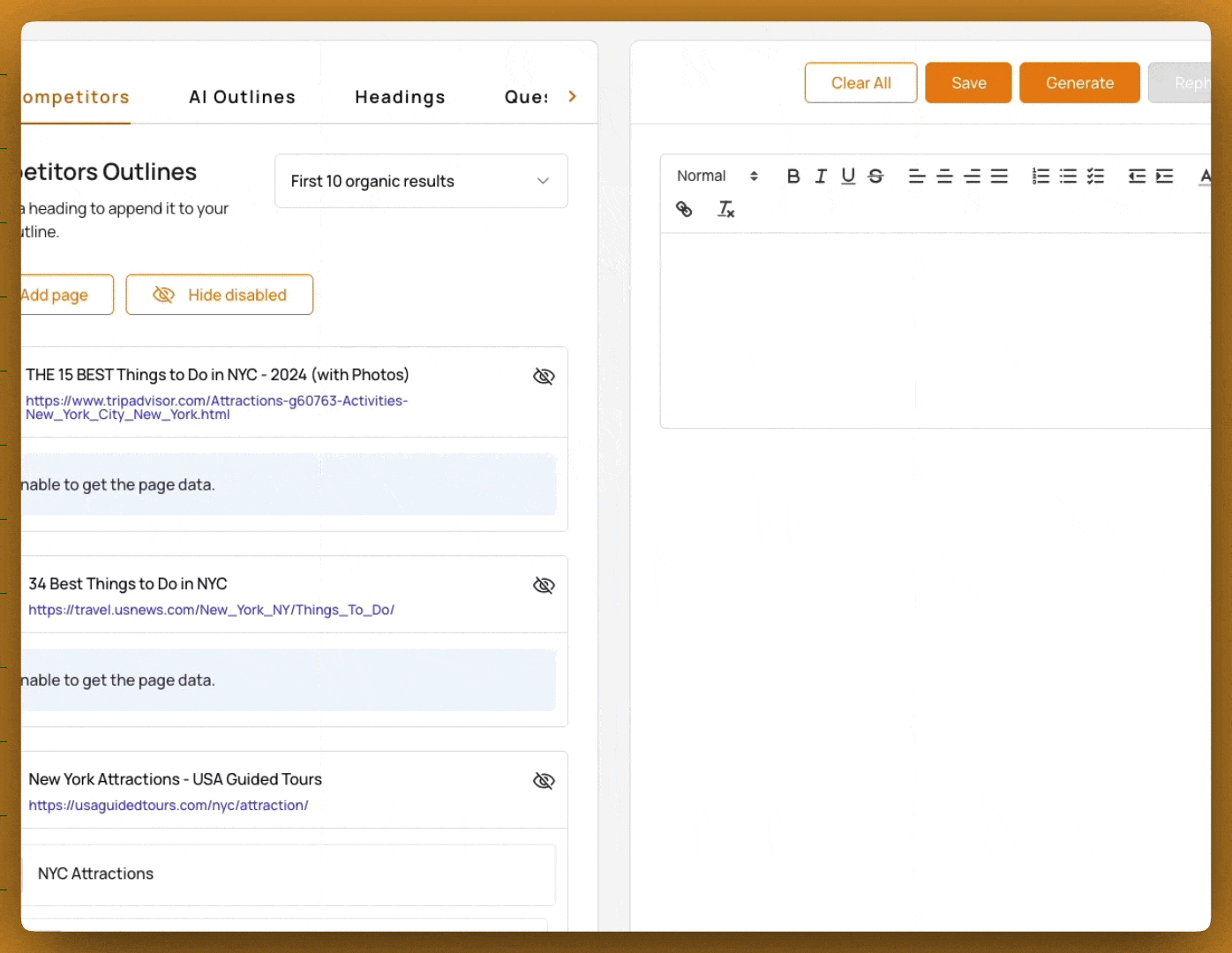
This way, the writer has all the SEO data they need to formulate their content. It also ensures your writers don’t miss adding critical sections that search engines expect from top-ranking pages.
thruuu also has a stellar SEO page audit tool that optimizes your existing content by comparing it against your main competitors. thruuu audit tool checks all the SEO On-Page audit boxes, such as:
- Ideal keyword usage
- Optimized meta tags
- Perfect content and heading structure
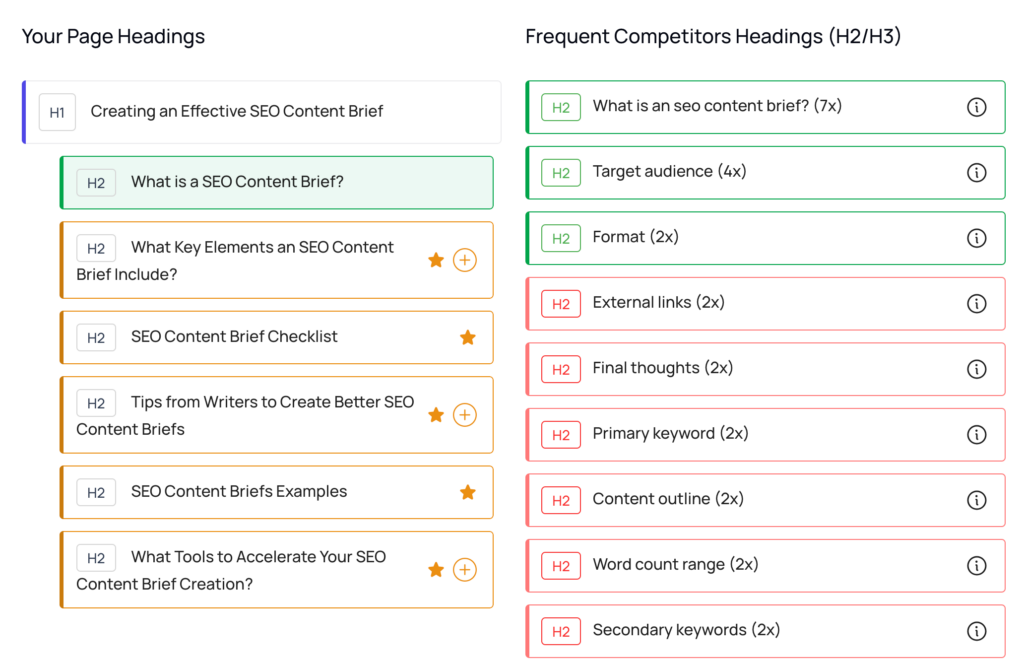
Pricing: thruuu offers a great deal that starts you off with a free trial of 10 one-time credits. Afterward, you can choose from a monthly plan ranging from $19 to $99.
Alternatives: Surfer SEO, MarketMuse, Clearscope
Get Started for Free with thruuu
Our end-to-end content optimization solution empowers your team to crack the Google algorithm, craft exceptional content, and achieve remarkable organic search results.
Trello
Trello is a popular application based on the “kanban” project management framework. It uses visual boards or “cards” to help you organize the projects in your content pipeline.

It is easy to use and doesn’t require a steep learning curve like other, more advanced content management tools. With the Trello free version, you can easily set up a content calendar in minutes.
Trello has an intuitive drag-and-drop interface, which you can use to create boards for your content schedule.
For example, you can have distinct columns or lists for each stage of your content projects, such as “Ideas,” “Ongoing Content Creation,” and “Published.”
The card-based system allows you to include details like checklists, attachments, and even due dates so you can study your content workflows at a glance.
It also has other collaborative features where you can share and assign tasks to your team members. Moreover, its free version lets you integrate your workflows with software such as Google Drive and Slack.
Pricing: Trello has a free version offering unlimited cards. Alternatively, you can choose from per-user/month plans starting at $5.
Alternatives: Asana, ClickUp
Google Docs
A seasoned tool that has been around since 2006, Google Docs remains as valuable as ever to content marketers.
It has evolved to include advanced features, making it a go-to tool for writing, editing, and sharing documents with team members in real time. The best part is that you can do all of this for free.
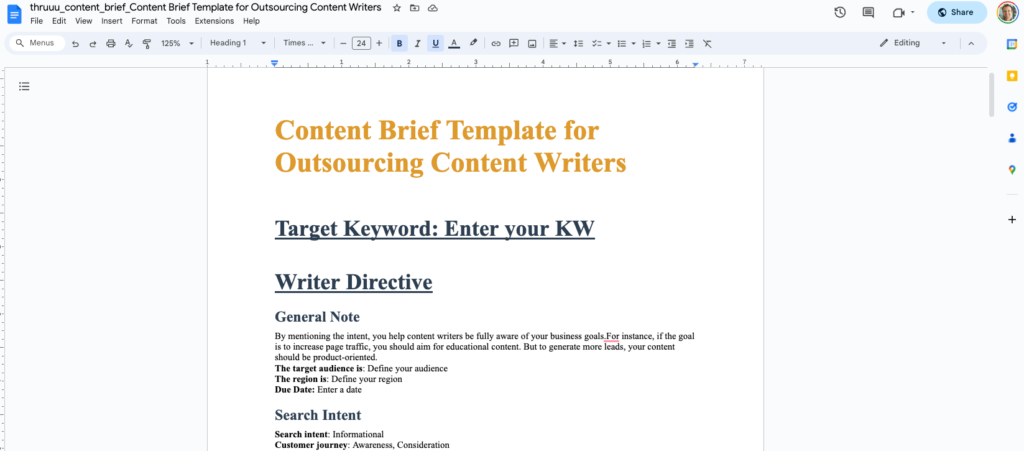
Its standout feature is its real-time collaborative feature, which allows numerous team members to work on a single document simultaneously without affecting each other’s workflow.
You can leave comments, suggest edits, and even track changes. This is the perfect tool to brainstorm with writers or seek feedback from clients before an article goes live.
You can easily share documents via a simple link and set up specific permissions so only certain people can view, edit, or comment. Imagine how easy this makes your job as a content marketer, where you can share outlines, suggest feedback, and update changes all on the same online document.
With features like revision history and offline access, you won’t have to worry about losing important data.
Pricing: The free Google Docs version offers 15 GB of storage. If you need more storage and collaborative tools, you can subscribe to its business plans, which begin at $6 per user/month.
Alternatives: Microsoft Word, Zoho Writer, Notion
ChatGPT
Let’s be clear: we don’t advocate using AI to create content from scratch. However, you can definitely use ChatGPT to delegate some of your content marketing tasks.
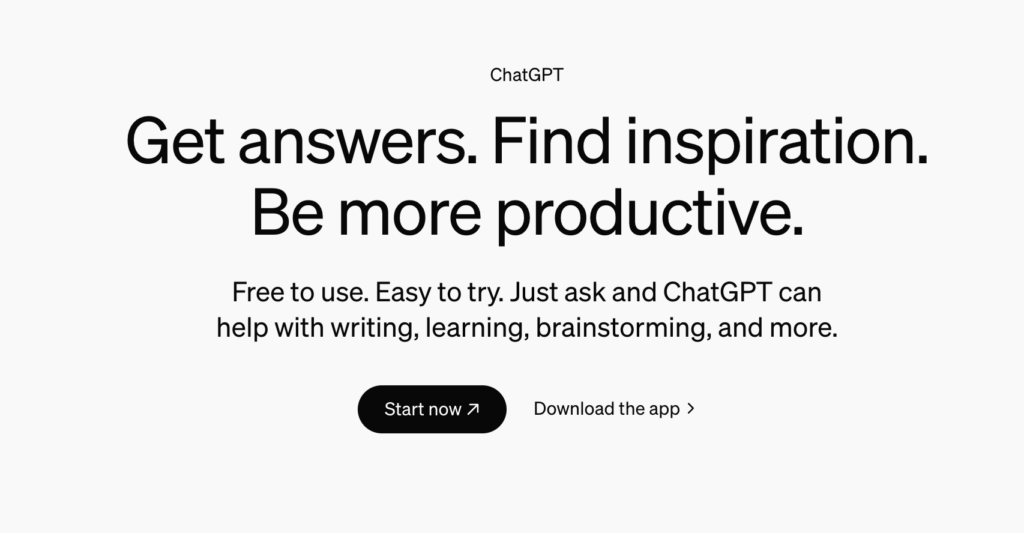
While it gets a bad rap, ChatGPT is a superb tool if you use it judiciously for tasks such as content ideation, content reviewing, or even translation.
It provides support with repetitive tasks and generates fresh ideas for your content calendar.
For example, you can ask the tool to help you brainstorm blog ideas for “office productivity.” With the right prompts, it can deliver interesting angles you may not have considered.
ChatGPT can help you review your drafts and make them more reader-friendly by identifying sentence structuring errors and grammatical issues.
This will help you optimize your content and make it publish-ready for search engines.
Another excellent way to use ChatGPT is to create cross-platform content. Simply put, you use the content you’ve developed for one platform and have ChatGPT package it for another.
For example, you can use ChatGPT to repackage a blog article into digestible pointers or key takeaways to share on your social media handle.
Pricing: ChatGPT’s 3.5 version is free but provides limited access to GPT-4o and 4o mini. ChatGPT Plus starts at $20 per month.
Alternatives: Google Gemini, Claude
Yoast SEO Plugin for WordPress
Checking your content with the Yoast SEO plugin is like taking one last look in the mirror before heading out the door.
It is the perfect tool for budget-friendly marketers who want a thorough review of their on-page SEO elements before publishing a blog or article.
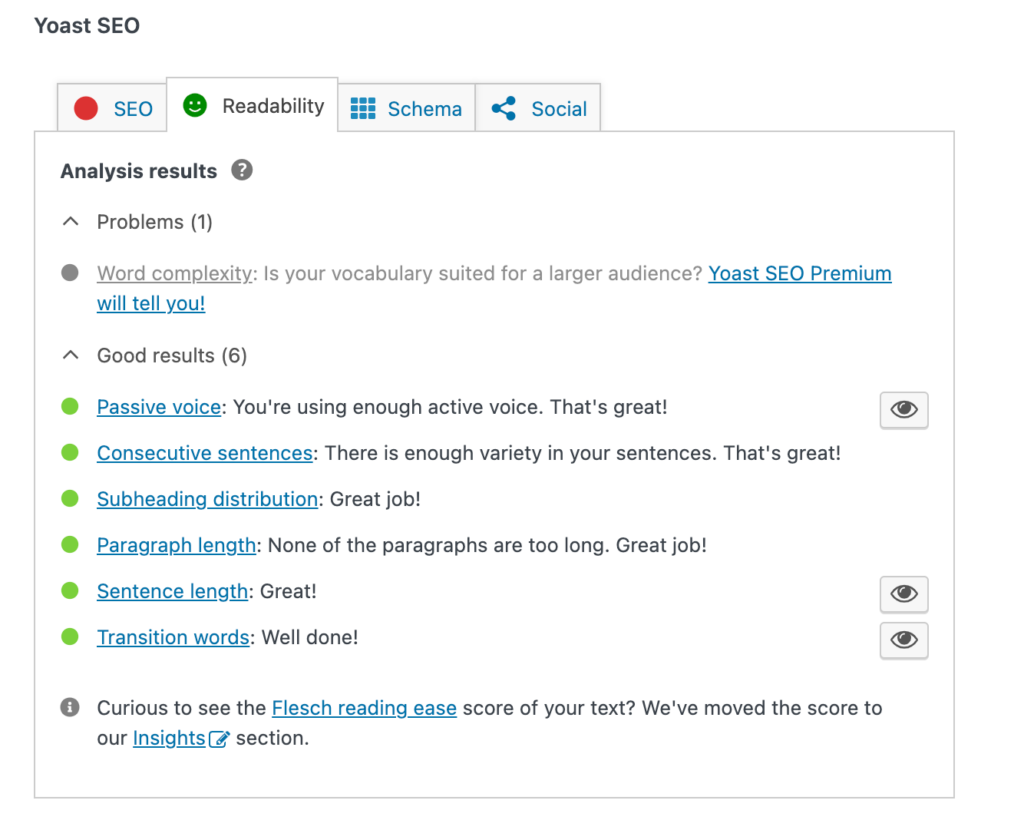
Do note, however, that Yoast is a WordPress plugin, meaning it is compatible with websites built on the WordPress platform.
With SEO’s free version, you can see how well your content is optimized for specific keywords.
It gives you a real-time overview of your content’s readability and keyword usage, making it easier to fix last-minute issues that will help you rank higher.
For example, with its readability checker, you can ensure your articles aren’t overly complex and keep the reader hooked.
It helps you catch complex run-on sentences that deter flow, highlights passive voice sentences, and suggests the ideal paragraph length for your content.
As a result, your article comes out more polished and reader-friendly — two of the few elements that search engines prioritize while ranking articles.
Yoast’s free version also provides a handy snippet or preview that lets you see how your article will appear in search results.
This can help you review whether your meta titles and descriptions are up to par. Its other features include XML sitemaps to make your content more discoverable and internal linking suggestions to improve structure.
Pricing: There is a free version, along with a Yoast Premium version that starts at $99/year
Alternatives: Rank Math
Google Search Console
Google Search Console (GSC) is one of the best free keyword tools with a suite of features that help you make sense of your website’s search traffic and performance.
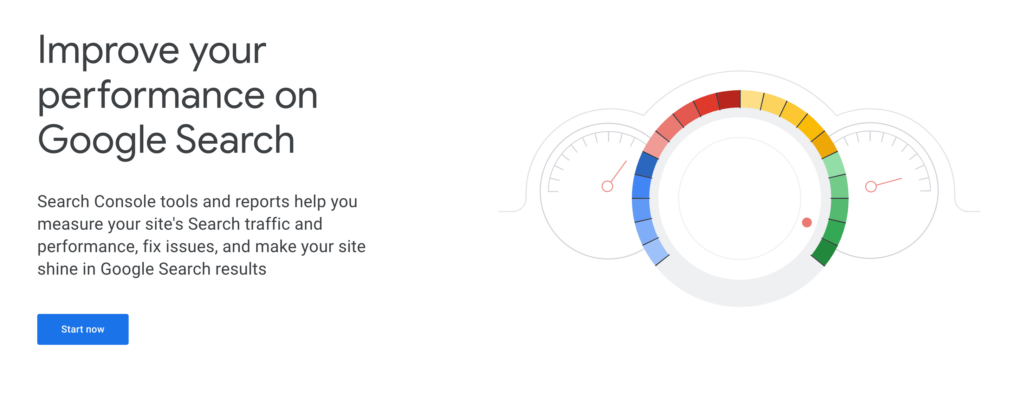
First, you can use it to see which keywords your site ranks for, its average positions, and click-through rates (CTR).
Once you have this data, you can adjust your SEO strategy to rank higher.
For example, if you observe that the keyword “hiking trails Colorado” has a good SERP position and CTR, you can target more content around this keyword.

You can also glean excellent search intent insights from GSC. These will tell you which queries bring the most traffic to your site.
Once you better understand what your target audience is searching for, you can craft more content to meet those needs. This will give you an edge over other sites that don’t effectively answer user queries in their content.
GSC has a host of other features, including indexing status to identify any coverage issues that might prevent your site from appearing in page results. It also helps you ensure your content is compatible with mobile devices, allowing users to enjoy a better experience.
Pricing: Free
Alternatives: None
Google Analytics
Google Analytics is a top-tier tool for discovering how your website performs and which site pages drive the most conversions. You can get a sense of your website’s performance via key metrics such as page views, bounce rates, and other user behavior analytics.
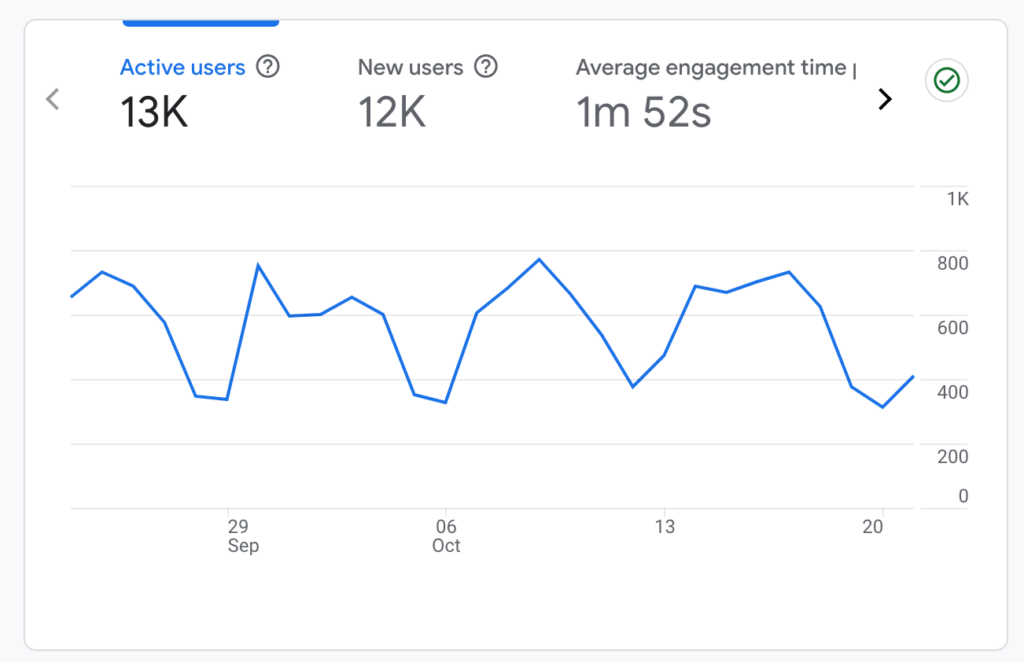
Based on these analytical metrics, you can gauge if your page or marketing material is meeting user expectations, and if not, adjust your content accordingly.
Additionally, Google Analytics helps you understand the source of your site visits. Are people finding your website organically? Are they coming in via social media or paid ads?
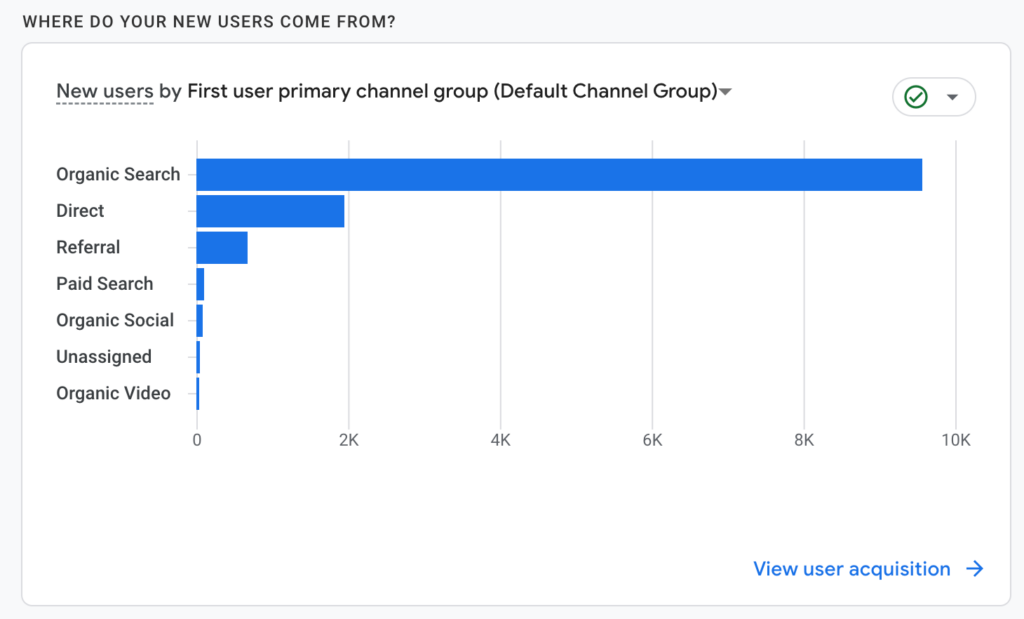
This is an important metric that can help you double down on the channels bringing in the most visitors and pull resources away from those that aren’t.
Its other standout features include:
- Audience insights to break down visitor data, such as demographics, geography, and user behavior
- Conversion tracking to measure user actions such as resource downloads and form submissions
- Real-time data to help you keep track of active site users and page views
Pricing: Google Analytics has a free version (GA4), while the premium version requires a subscription.
Alternatives: Matomo
Tips for Maximizing the Effectiveness of SEO Tools in Content Marketing
Here’s what you can do to make the most out of your SEO content marketing tools:
Stay Updated on Industry Trends and Algorithm Changes
Search engine algorithms change like the weather. Some changes you can predict, while others need you to prepare and stay on top of the latest industry trends.
Your content strategy will be successful if you adapt to changing trends and algorithm updates.
Stay in the loop by subscribing to reliable SEO blogs and following industry thought leaders on social media. You can also participate in regular industry webinars to stay up-to-date.
Regularly Monitor and Adjust Your Strategy
Using SEO tools and devising a content strategy isn’t a linear effort. It entails constant monitoring, reviewing, and adjustments based on your analysis.
You can regularly monitor your content strategy with this approach:
- Review key metrics for your website, including keyword rankings, engagement, and traffic.
- Use analytical tools to glean insights on how your content is performing.
- Periodically adjust your SEO tactics and analyze competitor data to stay on top.
Utilize Tools for Content Promotion and Distribution
Content marketing is an ongoing process where you not only create content but also make efforts to promote and distribute it through the right channels.
This means promoting your content to a wider audience via social media, email newsletters, paid ads, and other online forums where your target audience is the most active.
Social media is especially effective in promoting your content in the B2B space. Y
ou can reach the right audience through social media sites like LinkedIn and X (formerly Twitter) by regularly sharing your content, establishing thought leadership for your brand, and engaging with business prospects who may be interested in your offerings.
As you gain visibility on social media, your website is more likely to receive traffic — ultimately giving your SEO performance a boost.
Empower Your Content Team
Our end-to-end content optimization solution empowers your team to crack the Google algorithm, craft exceptional content, and achieve remarkable organic search results.
